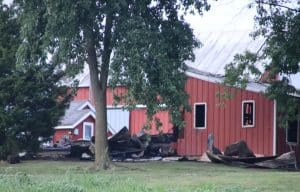Cornerstone Laine back in play?
While Cornerstone Laine was not mentioned specifically, the Waterloo City Council on Monday amended city code to allow for an override of zoning board decisions on future special use permit requests.
This amendment comes less than a month after the Waterloo Zoning Board of Appeals voted 4-3 against granting a special use permit for the proposed women’s recovery residence at 228 Mueller Lane, which is the former Rosedale House senior independent living site near Route 3 and Illinois Avenue.
By a vote of 7-1, the Waterloo City Council voted to approve adding the following language to the city’s code of ordinances dealing with special use permits:
“The Zoning Board of Appeals shall submit the entire record and a written decision explaining the action taken on a special use permit petition before the next regularly scheduled city council meeting. At that meeting, the city council will either affirm or reverse the decision of the Zoning Board of Appeals. The decision shall be based only upon the record from the Zoning Board of Appeals hearing.”
Alderman Jim Hopkins cast the lone dissenting vote on this measure.
Waterloo City Attorney Dan Hayes told the Republic-Times that placing final decisions on special use permit requests in the hands of the city council is a common practice, but just something that had not been on the books for Waterloo.
“Most municipalities leave final decisions on special use permits to the city council,” Hayes said.
Prior to voting on this amendment, Hopkins asked why this measure wasn’t first going to the Waterloo Planning Commission and Waterloo Zoning Board of Appeals.
“Because that’s the way it’s written up,” Hayes responded. “The council can do whatever they want. The council could make a change that nothing goes to planning and zoning, but they’re not doing that. They have the authority to do that.”
Waterloo Mayor Tom Smith said this amendment only applies to future special use permit requests, so it would not pertain to the zoning board’s decision on Cornerstone Laine last month.
“We felt the city should have more responsibility in this process,” Smith said.
Smith said he had not heard if Cornerstone Laine owners Adrian and Leisa Martinez plan to re-submit a special use permit request for the Mueller Lane site or elsewhere.
“They’d have to file an application with the zoning office,” Smith said.
Leisa Martinez, who was present at Monday’s council meeting, declined comment on the future of Cornerstone Laine and the action taken by the council.
The Cornerstone Laine saga began earlier this year with meetings on amending zoning language to include recovery residences as allowable in a B-2 General Business District with a special use permit.
After the planning commission voted for and the zoning board voted against such an amendment, the Waterloo City Council made it happen with a 5-3 vote in favor.
Then came the special use permit process, which was approved by the planning commission on July 20 but denied by the zoning board on July 21.
The overarching theme of those opposed to the Cornerstone Laine petition were related to it being housed on Mueller Lane, which resulted in Cornerstone Laine being shot down by the zoning board vote.
As the zoning board was the final stage at the time of the July vote, Waterloo Alderman Steve Notheisen said he believed the action was “discriminatory” and could open the city up to a lawsuit.
“To allow the zoning board to deny the recovery center a special use permit is a denial of the civil rights of those recovering addicts and is a violation of our oath of office,” the alderman was quoted as saying last month.
The city’s ordinance committee met on the proposed amendment Monday prior to that night’s city council meeting, approving the override language by a vote of 4-1.
Alderman Stan Darter made the motion to approve the amendment at the council meeting, which was seconded by Notheisen.
We have taken authority over the Zoning Board of Appeals,” Notheisen said after the meeting. “We want to be sure our elected officials are making the final decision.”
While aldermen are elected, those sitting on the planning commission and zoning board are appointed.
Adrian and Leisa Martinez came up with the idea of Cornerstone Laine following the death of their daughter Chloe in 2019 due to an accidental overdose.
The Martinezes got in touch with Art and Beth Deno, who run a St. Louis-based nonprofit called ACPD that helps people and their families overcome addiction and its effects. ACPD stands for Austin Christopher Paul Deno, the name of Art and Beth’s son who died from an accidental overdose in 2016.
Cornerstone Laine would be dedicated to helping women experiencing drug and alcohol addiction and provide a Christ-centered, supportive residential recovery environment for women ages 18 and above through a 90-day program that includes meals, peer support, 12-step programs and a Bible study for $8,000. Two scholarships would be available every 90 days, and residents can use various payment options if needed.
Some conditions agreed to by the Martinezes as part of the planning commission’s initial special use permit approval included specifying the facility should be women-only, facility inspections conducted every six months, clients must be detoxed before arriving to the facility, each client is allowed a visitor once a week after one month of residency and clients are not allowed to have a car or a job while residing at the facility.
Security features would include an alarm system, 24-hour supervision and locked doors and windows.
Lastly as part of the permit approval, residents are to be there voluntarily and not as part of a court-mandated program.






